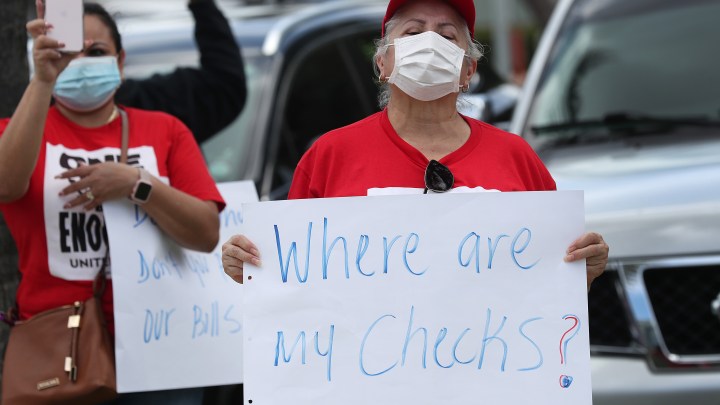
Jobless Americans struggle to get and keep benefits
Jobless Americans struggle to get and keep benefits

More than seven months after COVID-19 all but shut down the U.S. economy, 22.6 million Americans were getting unemployment benefits — either through a state or federal pandemic program — according to the Labor Department. And 751,000 newly unemployed workers filed initial jobless claims, which is more than in any week during the Great Recession.
And people who have been out of work and dealing with the unemployment system have similar stories to tell: about facing long delays and having trouble getting benefits, juggling work and homeschooling, and struggling financially.
Daniella Knight of Fairfax, Virginia, ticks off pretty much all those issues.
To start with, she’s got three children, ages 3, 5 and 9. “No one is at school, everyone is home,” she said.
Earlier in the pandemic, Knight tried to juggle two independent contractor jobs as a property manager and pediatric sleep consultant. Both were jobs she could do at night when her husband was watching the kids.
But she couldn’t keep it up with homeschooling. “I’m going through the stages of grief, in a way. I’ve been depressed, mourning life before. I have quit one of my jobs, because obviously it was impossible,” she said.
Knight’s husband just started a new legal job at a government agency, after several months out of work. “So that at least was a big relief,” said Knight. “But we still have not seen anything — any money — from his unemployment benefits for the two-plus months that he was not employed. We’re trying as best as we can to keep up with bills.”
They’re expecting more than $5,000 in benefits. Knight said that the Virginia Employment Commission is still reviewing the claim.
Jobless benefits started coming in the spring for An Zebley of Kansas City, Missouri, after she shuttered her one-woman business, Yum Bakery, in the first wave of COVID shutdowns.
Like everyone on unemployment at that time, she got an extra $600 a week in federal pandemic unemployment compensation. “That helped a little bit,” she said, “[It] helped me pay my rent, basically, and keep the electricity on.”
In the summer, Zebley reopened the bakery — first for a few hours, then a few days per week.
But then, she got COVID. “It’s been rough, for sure,” she said. “I have had the long-haul COVID stuff going on.” When she started feeling better, she reopened the bakery, which is now just barely breaking even. And she dropped off the federal Pandemic Unemployment Assistance program, which makes gig workers, independent contractors and others eligible for state unemployment benefits.
After the $600-a-week Federal Pandemic Unemployment Compensation payments expired nationwide at the end of July, she said she pushed herself to go back to work instead of opting to receive her $120-a-week state benefit. “I probably should not have done that,” she said. “I wasn’t contagious. I wasn’t, you know, putting anybody else at risk, but I wasn’t ready,”
Fear of illness has kept some people on the unemployment rolls for the long haul.
Mark Smith, who is in his late 40s, worked as a janitor in a factory in Portland, Oregon, for 25 years until it closed when the pandemic hit. Then he went on unemployment.
He said he could look for another job, but he’s decided not to. “I’m basically choosing, as long as the pandemic and the emergency is still going on, to be at least one less vector of possible contagion,” he said.
Smith has a roommate who works in health care and an elderly relative living with them. He’d been getting about $300 a week on unemployment, but at the beginning of October, he ran out of his 26 weeks of state benefits and applied for the 13-week federal extension.
“I’m hoping, fingers crossed,” he said.
It’s been four weeks, and so far, he hasn’t gotten any money.
There’s a lot happening in the world. Through it all, Marketplace is here for you.
You rely on Marketplace to break down the world’s events and tell you how it affects you in a fact-based, approachable way. We rely on your financial support to keep making that possible.
Your donation today powers the independent journalism that you rely on. For just $5/month, you can help sustain Marketplace so we can keep reporting on the things that matter to you.


















